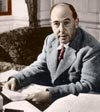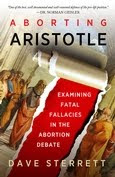Last year Apologetics 315 did a
Read Along project with the excellent apologetics textbook
Christian Apologetics by Doug Groothuis. (The index can be found
here.) It was
only 700+ pages.
Then we tackled a second, shorter book, under 300 pages, just 18 chapters:
Is God Just a Human Invention: And Seventeen Other Questions Raised by the New Atheists by
Sean McDowell and
Jonathan Morrow. (Hear the
interview with the authors
here and
book review here.)
Due to a number of requests, we will be restarting this Read Along this month for a second time around!
Why choose this book? For a number of reasons:
First, the quality of the content is excellent. The authors have a wonderful ability to distill key ideas concisely without sacrificing depth.
Second, the size is right. The chapters are a manageable size and the book isn't overwhelming. The diversity of content keeps it fresh, while staying relevant to key apologetic topics.
Third, it introduces the reader to the key voices on the apologetic landscape. It also provides helpful pointers to key resources for further reading. This is a great place to get started down the right path in dealing with each particular issue.
Finally, this book covers the kind of issues that we deal with everyday in conversation, on the internet, and as we grapple with the issues ourselves.
So what's the plan? For those who did the Read Along
previously, you'll see that things will flow the same way: Audio will be provided each week with chapter summaries, a PDF study guide, and a place to discuss the reading online.
Okay, so when do we start? We'll start next Friday. In the meantime, you can pick up the
paperback or the
Kindle version of the book so you'll be ready to start.
Looking forward to reading along with you again!
 Theistic Evolutionism: An understanding of the development of life on earth that arose out of the attempt to relate the interpretation of Genesis to the scientific theory of organic evolution by taking a nonliteral view of the creation account while wholeheartedly trusting its truthfulness as the Word of God. Theistic evolution teaches that while the various species emerged throughout the evolutionary process, God superintended the development of life. That is, evolution was the means that God used in bringing about the divine purpose of creating life on this planet. Theistic evolutionists generally maintain the classical Christian doctrines of creation, original sin and human depravity in need need of redemption.1
Theistic Evolutionism: An understanding of the development of life on earth that arose out of the attempt to relate the interpretation of Genesis to the scientific theory of organic evolution by taking a nonliteral view of the creation account while wholeheartedly trusting its truthfulness as the Word of God. Theistic evolution teaches that while the various species emerged throughout the evolutionary process, God superintended the development of life. That is, evolution was the means that God used in bringing about the divine purpose of creating life on this planet. Theistic evolutionists generally maintain the classical Christian doctrines of creation, original sin and human depravity in need need of redemption.1








































